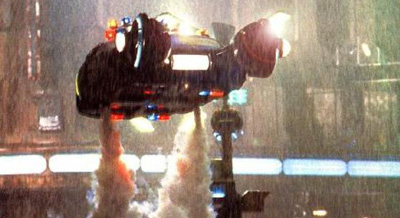Viking Night
Blade Runner
By Bruce Hall
July 26, 2011
He discovers that the fugitives have attempted to infiltrate the Tyrell Corporation. Nobody is sure what they want, or why they would risk going back to the very facility where they were manufactured. But it is possible to discover a Replicant by running a comprehensive psychological test called Voight-Kampf. Despite their appearance, Replicants are still machines, without the benefit of experience and memory. So when you ask them questions about their past, they usually trip themselves up. The Blade Runner Deckard was called in to replace did just that, and paid dearly for it. It’s now Deckard’s job to pick up the trail - and that trail leads him straight to Eldon Tyrell (Joe Turkel), the mastermind behind the company.
Deckard is sent to Tyrell to try Voight-Kampf on a prototype model, a Replicant called Rachel (Sean Young). Rachel has been implanted with false memories, meaning she does not know she’s a machine – and this sets up the film’s central premise: If humans can create other humans out of thin air, what does it even mean to be human? When our memories can be digitally scrapbooked and reproduced at will, what happens to our individuality? What use is God when technology has rendered life and death almost meaningless? Blade Runner wisely declines to answer these questions directly. Instead, it examines what happens when ordinary humans – and extraordinary Replicants – attempt to grapple with them.
The Replicants have become curious about their nature, making them hard to control; ironically making them More Human Than Human™ in fact and not just in name. Tyrell explains that implanting them with memories helps them feel like real people, making them easier to manipulate. But the obvious question is once you’ve made a Replicant believe it is human, is it then entitled to human rights? Humans forced to work against their will are called slaves, and once they begin to realize this, the Replicants revolt. The leader of the fugitives is Roy Batty, a combat model built to lead with charisma, and to kill without pity. Roy Batty is determined to find a way to circumvent his four year lifespan and earn freedom for his brethren. At the same time, Rachel discovers her true nature and goes into hiding, unwittingly putting herself on Deckard’s retirement list. It’s a sticky wicket, and it’s hard not to feel sorry for them.
And this is precisely why Deckard pursues his assignment so reluctantly; he feels pangs of sympathy for the very beings he’s spent his whole career hunting down. As he begins to encounter the insurgents, he’s forced by their desperate actions to see them as human even as he kills them off - even as he begins to develop feelings for Rachel. It isn’t long before Deckard begins to question his work, his world and even his OWN humanity. And when he finally comes face to face with Roy Batty, their confrontation is as philosophical as it is physical. Sadly, this brings me to what I feel is the biggest flaw in the entire film. Most will disagree, and many will excoriate me for it, but I stand by what I’m about to say and having seen Blade Runner dozens of times, I’m pretty comfortable with my opinion.
Continued:
1
2
3
|
|
|
|




